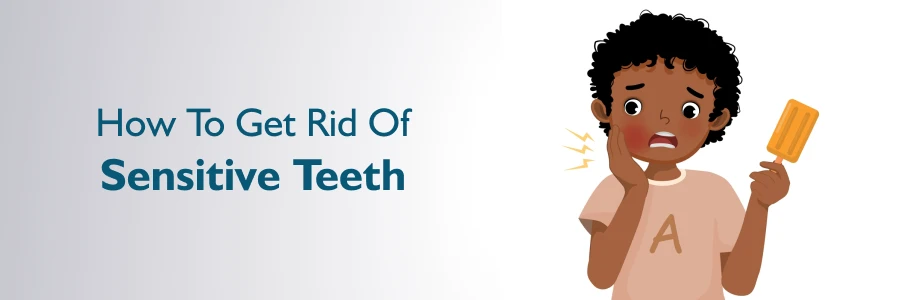- Cardiology 84
- Dermatology 45
- Endocrinology 33
- ENT 16
- Fertility 190
- Gastroenterology 78
- General-Medicine 81
- Gynecology 80
- Hematology 19
- Infectious-Diseases 33
- Neurology 52
- Oncology 34
- Ophthalmology 23
- Orthopedics 69
- Pediatrics 31
- Procedure 23
- Public-Health 144
- Pulmonology 59
- Radiology 8
- Urology 68
- Wellness 161
- Woman-and-child 77

How To Get Rid Of Sensitive Teeth
Teeth become sensitive when the protective sheath, called enamel, is damaged. When the enamel is damaged, the nerve endings are irritated, leading to tooth sensitivity.
Have you ever found yourself wincing when you take a bite of ice cream or a sip of hot coffee in the morning? If your answer is yes, don’t worry; you are not alone. This indicates that you suffer from sensitive teeth.
Though sensitive teeth aren’t a life-threatening issue, they can be pretty irritating. Many people who have sensitive teeth pass on hot or cold drinks just because they will make their teeth hurt.
Instead of passing things that hurt your teeth, you can find a solution when you see the cause. To get free from teeth sensitivity, let us know in detail.
Secure your health with a second opinion. Make informed decisions and book your appointment today!
Get A Second OpinionCauses of Sensitive Teeth
What causes sensitive teeth? Teeth sensitivity can result from a variety of reasons. Several causes damage the enamel and lead to tooth sensitivity. They include:
- Tooth decay
- Fractured teeth
- Exposed tooth root
- Gum disease
- Tooth erosion by highly acidic foods and drinks
Symptoms of Sensitive Teeth
Sensitive teeth symptoms typically include discomfort or pain when consuming hot, cold, sweet, or acidic foods and beverages. You may also experience sensitivity when brushing or flossing your teeth, often resulting in sharp, sudden pain.
Remedies of Sensitive Teeth
Home remedies for sensitive teeth offer natural solutions to manage discomfort and reduce sensitivity without resorting to harsh chemicals or treatments. Here are some effective remedies you can try:
Oil Pulling with Coconut Oil
Although coconut oil is a natural antibacterial agent, it does not appear to help reduce plaque on teeth and bacteria in the mouth, which decreases tooth sensitivity. Follow the guidelines below to use coconut oil for pulling.
- Put one tablespoon of extra-virgin coconut oil in the mouth.
- Swish it around for about twenty minutes.
- Spit out the oil and rinse the mouth with warm water
- After rinsing, brush your teeth gently, as usual.
- Do this every morning before brushing your teeth.
Sesame oil can also be used for pulling instead of coconut oil. It is highly recommended to spit out the oil after pulling, as it contains harmful bacteria in the mouth.
Saltwater Rinse
Saltwater improves the pH balance of the mouth, which makes it difficult for harmful bacteria to survive, and relieves teeth sensitivity quickly. To try this remedy.
- Mix a half teaspoon of salt in one cup of warm water.
- Rinse your mouth with this salt solution.
- Spit out the solution and rinse the mouth with plain water.
- Repeat this twice a day.
Clove Oil
Cloves are famous for their anti-inflammatory, anesthetic, and antibacterial properties. They help to reduce tooth pain and fight against oral infections. To try this remedy, apply a minimal amount of clove oil to a cotton swab and place it directly on the affected tooth for twenty to thirty minutes.
Another way to use clove oil for tooth sensitivity is to make a solution by adding 5 to 6 drops of clove oil to a half glass of lukewarm water. Rinse your mouth with this solution and spit it.
Guava Leaves
In Ayurveda, guava leaves are used to ease toothaches. To use guava leaves for teeth sensitivity, follow one of the below-mentioned methods:
- Chew one or two tender and fresh guava leaves for a few minutes and spit.
Add 4 to 5 guava leaves to one cup of water and boil it for 5 minutes. After cooling down, add some salt and use this solution as a mouthwash.
Ready to take control of your health journey? Book your appointment now and start your path towards wellness today!
Book an AppointmentFrequently Asked Questions
Desensitizing toothpaste, rinsing with saltwater, using hydrogen peroxide, mixing honey with warm water, drinking turmeric water, and drinking green tea can help alleviate sensitive teeth naturally.
A dentist may apply fluoride to strengthen tooth enamel and reduce pain. They might also recommend prescription fluoride for home use, desensitization, or bonding treatments to manage sensitivity.
Sensitive teeth can be caused by damaged enamel or exposed nerves. Consuming foods or drinks with extreme temperatures can trigger a sudden, sharp pain in such cases.
To fix sensitive gums, practice good oral hygiene, use a soft toothbrush, rinse with warm saltwater, and avoid harsh mouthwashes. Consult a dentist if sensitivity persists.
Treat cold-sensitive teeth with desensitizing toothpaste, avoid extreme temperatures in food and drinks, and maintain good oral hygiene. Dental treatments like fluoride applications and bonding can also help reduce sensitivity.

- Cardiology 2132
- Dermatology 168
- Endocrinology 135
- ENT 97
- Fertility 217
- Gastroenterology 232
- General 478
- General-Medicine 1685
- Gynecology 169
- Hematology 85
- Infectious-Diseases 208
- Neurology 207
- Oncology 345
- Ophthalmology 65
- Orthopedics 187
- Pediatrics 83
- Procedure 72
- Public-Health 209
- Pulmonology 126
- Radiology 13
- Second Opinion 311
- Urology 294
- Wellness 600
- Woman-and-child 447
- Others 10217
Related Blogs
If you have any questions, please fill out the enquiry form or call us, and we will get back to you promptly.
040-68334455